Along China's Western Edge
Note: This is the first in a series, core samples from the world. Not meant to serve as travel guides, much less as any sort of informed historical narrative of regions with which I have, often, only cursory acquaintance, these prose passages are personal, particular, often peculiar relations of encounter between poet, poetry, and place. They are the notes of a wayfarer, and of the kind prone to missing the festival in the square because he was squatting to watch a worm fight in an alley.
At Chicago’s O’Hare, boarding the flight to China for a two-part international poetry festival that begins in Beijing and then moves to the far western Xinjiang Autonomous Region. When the steward takes my ticket, I notice fluorescent orange earplugs dangling from a string around his neck. Are my first instincts always self-protective and proprietary that I wonder, What does he need them for, and where are mine?
* * *

At the Xi Xuan Hotel in Beijing, we take the stairs from the lobby down to the basement conference area. The ante-room is opaque with smoke, otherwordly, like a waiting room in Hades. Local poets furiously lighting up before the panel begins. The guidebooks suggest bringing presents to a Chinese host or business partner, and good quality cigarettes, Marlboros in particular, are recommended. The first time I visited China, I brought them. But it felt complicated, from my perspective, coming from a country where smoking is banned from most public spaces, where the dangers are so specifically categorized, to express personal fondness with a carton of tar and methane. On the other hand, as I will find, the Chinese have no qualms about trying to embalm me with compulsory shots of bai jiu and endless toasts. It’s curious that bonding is so often a kind of coalitionary self-destruction.
In the conference room, we take our seats, the hosts are thanked, the press identified, the writers, thirty Chinese poets and a dozen international poets, introduced by Xi Chuan, our bilingual host, poet, and thinker, a man at ease in his body. He looks down when he talks, unconcerned about eye contact, and periodically swipes hair from his eyes. During the long passages in Chinese, I begin to see that the gestures of his hands are also organs of language.

Xi Chuan
* * *
Now the roundabout of first comments. German poet and translator Wolfgang Kubin credits Ezra Pound’s translations for turning him, forty years ago, toward China. The mic goes to Scottish poet William Herbert, to several Chinese poets, to Kazuko Shiraishi, to French poet Andre Veltner. Tang Xiaodu, the other conference organizer, paraphrases Adonis: When I am abroad, I am most at home. Shimizu Tetsuo, from Tokyo, notes that unlike most poetry, haiku is the product of group endeavor. (I wonder if writing in a public space, in a café, for instance, is a Western variation. We tune-in the energy of a public setting, but without relinquishing control?)
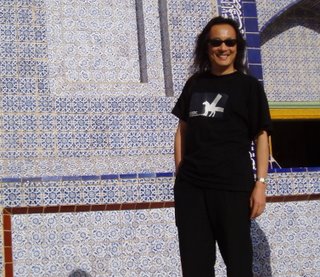
Yang Lian
* * *
Ex-patriot Chinese poet (living in London) Yang Lian quotes Tu Yuan’s “Question to Heaven” and identifies poetic endeavor as a questioning. Then he says, “If it weren’t for the substance of poetry, we wouldn’t be worthy of our own experience.” Emran Salahi, who will die of a heart attack two days after the conference, Salahi, the sweet-natured poet from Iraq, speaking Persian, says, in response to my question about traditional Persian forms, that his own poetry is quite modern, unrestricted by traditional conventions. (Later, I will see that what he means by this is that he writes in free verse.) The famous calligrapher and poet Ouyang Jianghe notes “Every mature poet has his particular vocabulary.” Che Qianzi, one of the younger, experimental Beijing poets, responds with a spontaneous poem, “part haiku,” which plays on the names of the two Japanese poets, Kazuko Shiraishi and Tetsuo Shimizu. The conference organizers, Tang Xiaodu and Xi Chuan, offer summarizing observations on the unsettled state of contemporary Chinese poetry in a culture shifting at warp speed. We don’t want to go backward, Xi Chuan observes, but ahead of us, the ways fork in innumerable directions and each is hemmed with liabilities and responsibilities.
Given the gravity of the discussion, it seems the panelists mean to map out a future for Chinese poetry, as though it might be prescribed, tagged with a five year plan. But I am merely inept at reading the forms of discussion here, much less the subtleties. What I take as evident bounces away from me. I begin to notice tensions, faces shaking no, one translator interrupting another to retranslate a comment into English. The topic,
Where is Chinese poetry going in the age of globalization, is enormous and of course the answer will be found in poems, not panels, so I try not just to listen, but to listen into. What else is being asked, what is at stake for them?
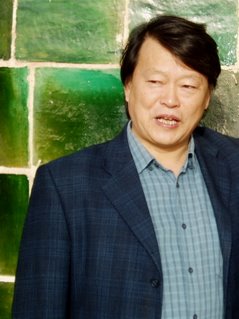
Tang Xiaodu
* * *
Five airless hours after the first conference panel begins, we swarm back through the ante-room’s cigarette nebulae, and back up the stairs to the hotel restaurant where, exhausted, we plop down at round tables and aim our chopsticks at the endlessly various plates and bowls circling on the Lazy Susan.
* * *

Stone Boat at the Summer Palace Lake
* * *

Kashgar Airport
* * *

At the Poet’s Tomb
* * *

Evening Prayer, Mosque Minaret
* * *
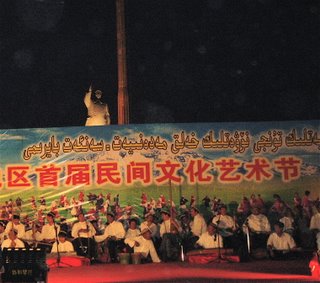
Evening Performance of Traditional Musicians, Statue of Mao Presiding
* * *
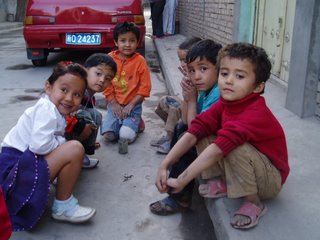
Worm Fight
* * *

Cemetery in the Autonomous Region
* * *

Mountains in the Autonomous Region
* * *

The Old City
* * *
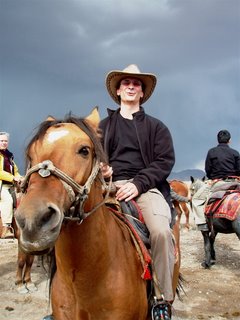
Author before the Storm
* * *
Where IS Chinese poetry going in the age of globalization?
I’m not so presumptuous that I would say. But certainly it is going to America, among other places. Here is a glimpse of some of what I see going on.
Bei Dao, a figure nothing like T. S. Eliot or William Faulkner, has achieved something of their status in China. Whether it serves as a model or a point of departure, his work must be taken into account by any serious Chinese poet. As Flannery O’Connor said of Southern writers in relation to Faulkner, "Nobody wants his mule and wagon stalled on the same track the Dixie Limited is roaring down." Bei Dao’s poems, translated powerfully by Eliot Weinberger and published by New Directions, don’t remind you of freight trains, but they carry a markedly evocative force. Here is an uncollected translation of one of Bei Dao’s recent poems that I heard him read in Chile, the audience enthusiastically swarming him afterwards.
Ramallah
In Ramallah the ancients play chess in the starry sky
the endgame flickers
a bird locked in a clock
jumps out to tell the time
in Ramallah
the sun climbs over the wall like an old man
and goes through the market
throwing mirror light on
a rusted copper plate
in Ramallah
gods drink water from earthen jars
a bow asks a string for directions
a boy sets out to inherit the ocean
from the edge of the sky
in Ramallah
seeds sown along the high noon
death blossoms outside my window
resisting, the tree takes on a hurricane's
violent original shape
Xi Chuan, who is more than a decade younger than Bei Dao, marks the beginning of a “new generation.” A critic as well as a poet, Xi Chuan is one of the poets most articulately involved in questioning the trajectory of contemporary Chinese poetry. Several Americans have been interested in translating his work, but almost nothing is available here.
Wang Ping, has lived in the U.S. for more than twenty years. Associated early on with Lewis Warsh and the 1980’s lower east side New York poetry scene, she helped to translate and call attention to the work of her contemporaries and, in addition to writing criticism and fiction, writes poetry. Her book
The Magic Whip mixes prose and poetry, a formal equivalent of the themes with which the book is concerned.
Zhang Er, also associated with the New York poetry scene, with Leonard Schwartz and Talisman House, has seen her work translated by a panoply of good American poets, and her first major book in English,
Verses on Bird, was published recently by the excellent Zephyr Press which also publishes Duo Duo, a riveting and influential poet who trained, not incidentally to his poetry, as an opera tenor.
Zhang Er has edited an anthology of Chinese poets, including the work of younger innovative poets like Mo Fei and Cao Shuying. It will, no doubt, play a major role in creating an audience for innovative Chinese poetries. In her introduction, she notes, with reference to the younger Chinese poets she includes, that: “Their work is complicated, filled with conflicted thoughts and emotions, which demand various writing strategies, as well as a wide range of vocabularies and forms. Their aesthetic stand, if I can speak for them, is in stark contrast with the conventional Western view of Chinese poetry's ‘pure, natural, clean, concise imagism.’ For sure, they use plenty of images, but they use them in their messy and maximum way, along with many other strategies. Their view of the Chinese language, as reflected by these writings in Chinese characters, is holistic: the images of things themselves, the human perception and understanding of things, and the human voices that name them. At the root of the Chinese writing system (the characters) live things themselves, not just the images kept as records but the acceptance of things themselves, things that do not need explanation or even to have a fixed articulated name. Human perspective, reasoning and voice are somehow treated in the Chinese language as secondary or even arbitrary.”
One of the edgiest of the younger Beijing poets is Che Qianzi, who has been impossibly but aptly translated by Yunte Huang. Huang, who is known in China principally for his translations into Chinese of Ezra Pound’s
Pisan Cantos, is better known in the U.S. for his critical work and for his own poetry, notably the high-energy
Cribs, published by Tinfish Press.
The brilliant, exuberant Hu Xudong, who teaches World Literature at Peking University and speaks of a plural inner self, writes a high speed, macaronic poetry that incorporates provincial dialects, advertisements, classical references, and surrealism. His most recent book awaiting translation into English is titled
When Love is a Spreading Disease.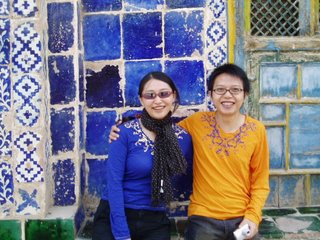
Hu Xudong (right) with Zhou Shu
* * *
Zhaiyong Ming, of Chengdu, is one of the most widely admired poets in China. Her early work is notable for its dense ambiguity, for its shifting fields of association and its dark intimations. Her more recent poems are limpid and precise, easier to translate. But Like Xi Chuan’s, Zhaiyong Ming’s considerable accomplishment as a Chinese writer has yet to be brought over into English in a collection that makes clear why she is so highly regarded.
In Shanghai, the poet Wang Yin makes his living as a photographer and writes the most vividly imagistic poems-- "one raindrop and then another/ on a power line"-- that I encountered in China. The images are made more complex by the lineation, which breaks through the framing syntax, but the emotional registers of the poems are clear and intense.

Wang Yin
* * *
Living in Providence, RI, Xue Di’s translated work has been well-received in the U.S. (even inciting comparisons with Rimbaud). And London-based Yang Lian’s ambitious, often book-length poems have been widely translated in Europe but are most readily available to Americans through Green Integer’s
Yi and through Blood Axe’s
Concentric Circles. Zhou Zhan, whose scholarly work has focused on translation and contemporary Chinese poetry, has a widening fan base for her own work which has been appearing in translation in England and the U.S. I’ll close this essay with a poem of hers from the series Death in Childhood. It is translated by Susan M. Schultz and Jennifer Feeley.
Debtor
He used his sign-off to repay
money owed in this world of dust the rope
borrowed in perpetual debt
as though everyone alive became his creditor
secretly condemning him all solutions to follow the one
child witnessing death for the first time
in constant fear of life’s debt
death is itself not frightening it’s only prolonged
a person’s body posts his shadow
on memory’s earthen wall
takes an old man’s voice while he lives
shutting it behind the wall . . . she startles
awake from her dreams hearing the cadence of his speech
his chatter about the weather about bees
and summer’s mosquitoes (children can’t fathom
boredom) using boredom’s quickening, life
arrives appearances swiftly change—now he’s dead
he’ll never again grow old his body slender
at the intersection of dreams arousing her adult desires

Zhou Zhan
* * *

















